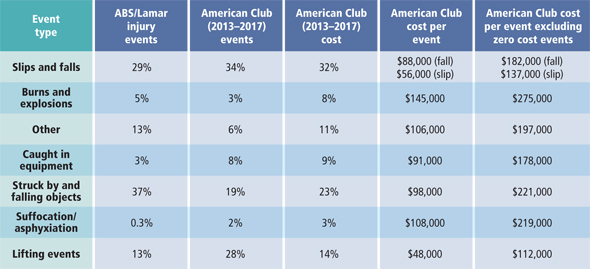Better reporting requirements for shipboard injuries and near-miss incidents are needed to improve safety for mariners, according to a recent report by the American Bureau of Shipping (ABS), The American Club and Lamar University.
The partners analyzed 12,000 injury records and 100,000 near-miss reports using information from ABS, Lamar and almost a decade’s worth of data from The American Club, a protection and indemnity (P&I) association. The data on slips, trips, falls and lifting injuries came from 31 organizations around the world, including the United States, Europe, Singapore, Hong Kong and South Korea.
“Shipping is currently navigating through a digital era in which asset owners are increasingly able to use the power of operational data to predict potential failures,” said Joseph Hughes, chief executive officer of the Shipowners Claims Bureau. “As these capabilities grow, the industry would be well counseled to also get ‘smarter’ about how it compiles and uses its safety data.” The Shipowners Claims Bureau, headquartered in New York City, manages The American Club.
A new aspect of the study is the financial cost of shipboard injuries. The American Club recorded more than 8,400 claims from 2013 to 2017, according to the report. The total cost of these injuries was $246 million, with 46 percent attributed to slips, trips, falls and lifting incidents. The claims, excluding incidents that had no cost, averaged $182,000 per fall or trip, $137,000 per slip, and $112,000 per lifting injury.
The goal of the project is to share the data and help put it into context for owners and operators. The information can be used to help identify hazards for specific spaces on board, as well as to identify potential new hazards.
“From a company perspective or a corporate perspective, they might be able to prioritize some resources to look at slips, trips and falls a little more,” said Dr. Kevin McSweeney, one of the authors of the study. He is director of human factors in the Safety and Risk Group at ABS Corporate Technology.
 |
|
ABS/Pat Rossi |
McSweeney said it could be difficult to make this issue a priority for companies. “At this point in time, the industry’s focus is not necessarily on slips, trips and falls,” he said. “It’s on things like low-sulfur fuels, ballast water treatment and that kind of stuff.”
That’s why the financial aspect of the injury study is so important. “It’s about time we started peeking behind the curtain and try to figure out what these costs are,” McSweeney said. “If we can actually show industry what these expenses related to these claims are, they might take them a little more seriously.”
ABS and Lamar University have published two best-practices guides covering these injuries that are available on the American Society for Testing and Materials (ASTM International) website. One guide is for recording and reporting maritime injuries (ASTM F3284-18) and the other is for reporting and recording near-misses (ASTM F3256-17).
Because terminology and reporting requirements are so different around the world, comparisons of shipboard accidents beyond slips, trips and falls with information from the European Maritime Safety Agency were not done.
“This is another example where consensus terminology and reporting requirements could yield valuable information to help reduce or eliminate injuries to seafarers,” according to the report.
Near-miss reporting is also inconsistent. Near-miss categories such as spills, poor housekeeping, condition of equipment, and use of personal protective gear do not match a specific injury category, but they still can result in many types of injuries.
Now that the report is out, it’s up to industry to take the next step, said Dr. Brian Craig, chairman of the industrial engineering department at Lamar University.
“A good way to do this is to bring some of the industry together with the Coast Guard,” said Craig, one of the authors of the report. “We’re all in this together — safety is not a competitive business.”

